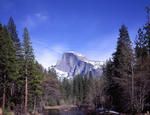There are four steps in the WSR process; three are required during plan revisions (inventory, eligibility, and classification) and one step (suitability) may happen during or after plan revision. We have completed a comprehensive inventory of rivers and have determined which rivers meet the eligibility requirements for WSR designation on the Inyo, Sequoia, and Sierra National Forests. All eligible rivers have also been assigned a preliminary classification as “wild,” “scenic,” or “recreational” based on the type of use, existing access, and development.
No new wild and scenic rivers designations are made as part of forest plan revisions, however, recommendations for designation may result from suitability studies. Wild and scenic river designations are made legislatively by Congress, or though Section 2(a)ii of the Wild and Scenic Rivers Act. Federal designation of state-designated wild and scenic rivers may occur via a state petition to the Secretary of the Interior. Designations may be for a river segment or an entire river and may include tributaries. Congressionally designated rivers are managed as part of the National Wild and Scenic Rivers System.
For more information on the wild and scenic rivers inventory, eligibility and classification findings, visit our webpage: http://www.fs.usda.gov/detail/r5/landmanagement/planning/?cid=STELPRD3833668
If you have questions, concerns or feedback about our Wild and Scenic River Evaluation process or initial findings please contact Christina Boston at 707-562-8837 or submit your input via Web-form at: http://tinyurl.com/earlyadoptersfpr.Feedback is most useful if received by February 1, 2016, and includes specific information that would assist in refining the WSR Evaluation.
In the past year, we have convened public discussion on numerous forest plan revision topics, including:
- June 2014: Preliminary wilderness inventory, step one of the wilderness evaluation process
- August 2014: Began National Environmental Policy Act process for forest plan revisions; shared our final wilderness inventory
- November 2014: Shared issues and concerns heard during public scoping
- January 2015: Sierra Cascade Dialog session about monitoring programs
- May 2015: Update on our wilderness evaluation progress
- June 2015: Inyo National Forest hosted a wilderness evaluation public workshop
- July 2015: Released draft proposed species of conservation concern lists
- September 2015: Shared our process for wilderness evaluation and identifying areas for potential wilderness recommendation; Invited public feedback on our proposed draft monitoring programs
- October 2015: Sierra Cascade Dialog session about wilderness, wild and scenic rivers, species of conservation concern, and the Pacific Crest National Scenic Trail


